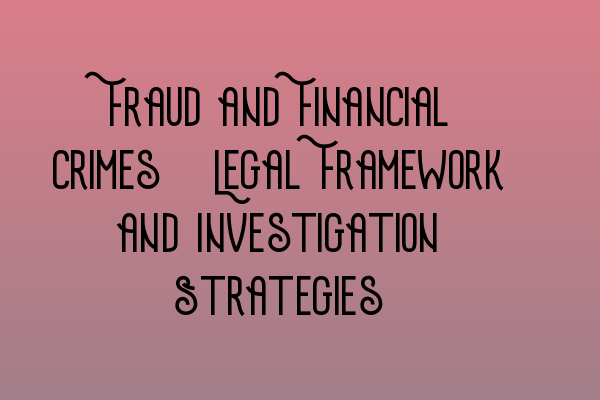Fraud and Financial Crimes: Legal Framework and Investigation Strategies
Financial crimes, including fraud, are a significant threat to the global economy. Such crimes can cause substantial financial losses to individuals, businesses, and governments. Therefore, it is crucial to understand the legal framework surrounding fraud and financial crimes, as well as the investigation strategies employed to detect and prosecute these offenses.
First and foremost, it is essential to define fraud and financial crimes. Fraud involves deceiving someone with the intent to gain a dishonest advantage, typically resulting in financial loss. Financial crimes encompass a broader range of offenses, including money laundering, bribery, insider trading, and tax evasion.
Legal Framework
The legal framework for fraud and financial crimes varies from country to country. In the United Kingdom, for instance, the primary legislation governing fraud is the Fraud Act 2006. This act provides a comprehensive definition of fraud and outlines the different types of fraudulent conduct.
Under the Fraud Act 2006, the offense of fraud is divided into three categories: fraud by false representation, fraud by failing to disclose information, and fraud by abuse of position. Each category has distinct elements and penalties, ensuring that different forms of fraudulent behavior are adequately addressed.
In addition to the Fraud Act 2006, other legislation, such as the Money Laundering Regulations and the Bribery Act 2010, plays a significant role in combating financial crimes. These laws impose obligations on individuals and businesses to prevent money laundering and bribery, further strengthening the legal framework.
Investigation Strategies
An effective investigation strategy is crucial to detecting and unraveling complex financial crimes. Investigative techniques employed in fraud and financial crime cases may include:
- Forensic Accounting: Forensic accountants play a vital role in unraveling financial irregularities. Through meticulous analysis of financial records, they can identify discrepancies, trace the flow of funds, and quantify the financial impact of fraud.
- Data Analysis: The examination of large datasets can uncover patterns and anomalies that may indicate fraudulent activities. Data analysis techniques such as data mining and predictive modeling assist investigators in identifying potential fraudsters.
- Whistleblower Reports: Tips from whistleblowers can provide critical information and initiate investigations into fraud and financial crimes.
- Cooperation with Financial Institutions: Collaboration with banks and other financial institutions is essential in tracking suspicious transactions and uncovering money laundering schemes.
- International Cooperation: Given the global nature of fraud and financial crimes, international cooperation among law enforcement agencies is vital. Sharing information and coordinating efforts across borders enhance the chances of successful prosecutions.
These investigation strategies, combined with the legal framework, create a comprehensive approach to combating fraud and financial crimes. However, it is essential to stay vigilant and adapt to evolving trends and techniques used by criminals.
In conclusion, fraud and financial crimes pose significant threats to individuals, businesses, and economies worldwide. Understanding the legal framework and employing effective investigation strategies are essential in combating these offenses. By staying informed and employing appropriate preventive measures, we can protect ourselves and contribute to a safer and more secure financial environment.
For more information on related topics, check out the following articles:
